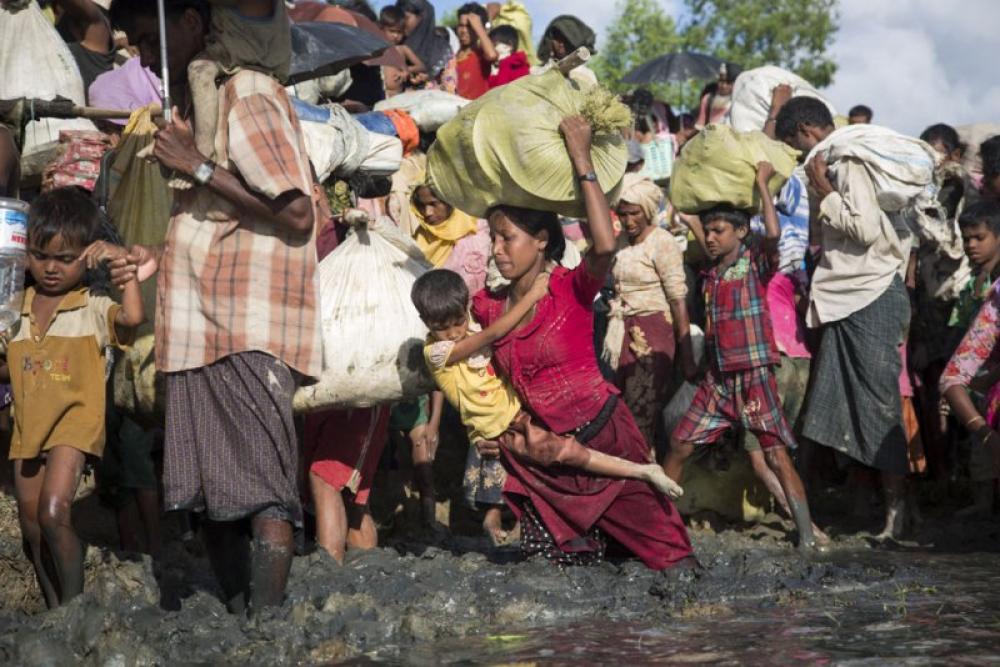Just Earth News | @justearthnews | 28 Nov 2017, 08:43 am Print

Cox's Bazar, Nov 28 (JEN): They fled Myanmar for dear life. But what awaited them were some of the worst nightmares. In the refugee camps of Bangladesh's Cox Bazar Rohingya women narrated to international media their horror stories of sexual exploitation and forced prostitution.
According to an investigative report by the BBC, most of the teenage Rohingya girls are being forced into sex slavery, thus exacerbating their already perilous state.
Speaking on the condition of anonymity, a 15-year-old refugee said that she was raped by the boatman who ferried her from Myanmar to Bangladesh.
She said that after she was taken in by an elderly lady, the latter forced her to sleep with many men a night.

Another 19-year-old too shared a similar experience.
The torture however is not limited to physical abuse. Some of the refugees have also complained about theft.
One woman told Nomia Iqbal, from the BBC's Newsday programme, earlier that she had been groomed and forced into prostitution in Bangladesh after fleeing.
She narrated how she was lured to a house by a man who promised to marry her and then forced her to have sex with many men.
A Sky News report quoted a pimp saying: "There are more and more people coming and they have lost everything. They don't have money, so more and more girls are coming into the business [read prostitution]."
The UN too confirmed that human trafficking and exploitation are rife among Rohingya refugees who have fled Myanmar to seek safety in Cox's Bazar, Bangladesh.
The United Nations migration agency said "understanding the scope of human trafficking is difficult in most settings due to the hidden nature of the crime."
Kateryna Ardanyan, a counter-trafficking expert of the International Organization for Migration (IOM), said: “In the chaos of a crisis like this, trafficking is usually invisible at first, as there are so many other urgent needs like food and shelter. But agencies responding to this crisis should not wait until the number of identified victims increases,” she added.

Over 600,000 refugees entered Bangladesh following the outbreak of an alleged sweep in Myanmar, in which the ethnic Muslim minorities were targeted.
The Rohingya population have accused the Buddhist majority Myanmar of committing atrocities against the community, which has been downplayed by the authorities.
Following an internal inquiry, the Myanmar government also handed a clean chit to its army, who were accused by the Rohingya and international community alike of committing arson.
In a sharp rebuttal, the government pinned the blame on Rohingya terrorists, who they referred to as Bengalis of carrying out the same.
Meanwhile, the UN too has been critical of Myanmar, accusing the nation of 'textbook ethnic cleansing'.
Bangladesh too have suffered due to the overwhelming influx.
According to Pintu Kanti Bhattacharjee, who heads the family planning board in Chittagong's Cox's Bazar district, most Rohingya families consists of a large number of members, sometimes up to 19.
He points out at the lack of education as a contributing factor to the Rohingya population crisis.
The reluctance among the refugees to use contraceptives, mostly male condoms, is also hampering Bangladesh's chances, who now sees sterilization as a better preventive method.
Elaborating the plan, Bhattacharya said that the local board has requested the national government to to approve a plan to launch vasectomies for Rohingya men and tubectomies for women.
Banner Image: UNHCR/Roger Arnold
Body Image 1: Screengrab from YouTube
Body Image 2: UNHCR/Roger Arnold
- Pakistan: UN experts express concern over lack of protection for minority girls from forced religious conversions, marriage
- Forty percent Pakistanis are currently living below the poverty line, says World Bank
- Hindu girl abducted in Pakistan, community members slam authority
- Thailand's lower house passes bill to legalise same-sex marriage
- UN says 758 allegations of sexual exploitation and abuse registered last year






